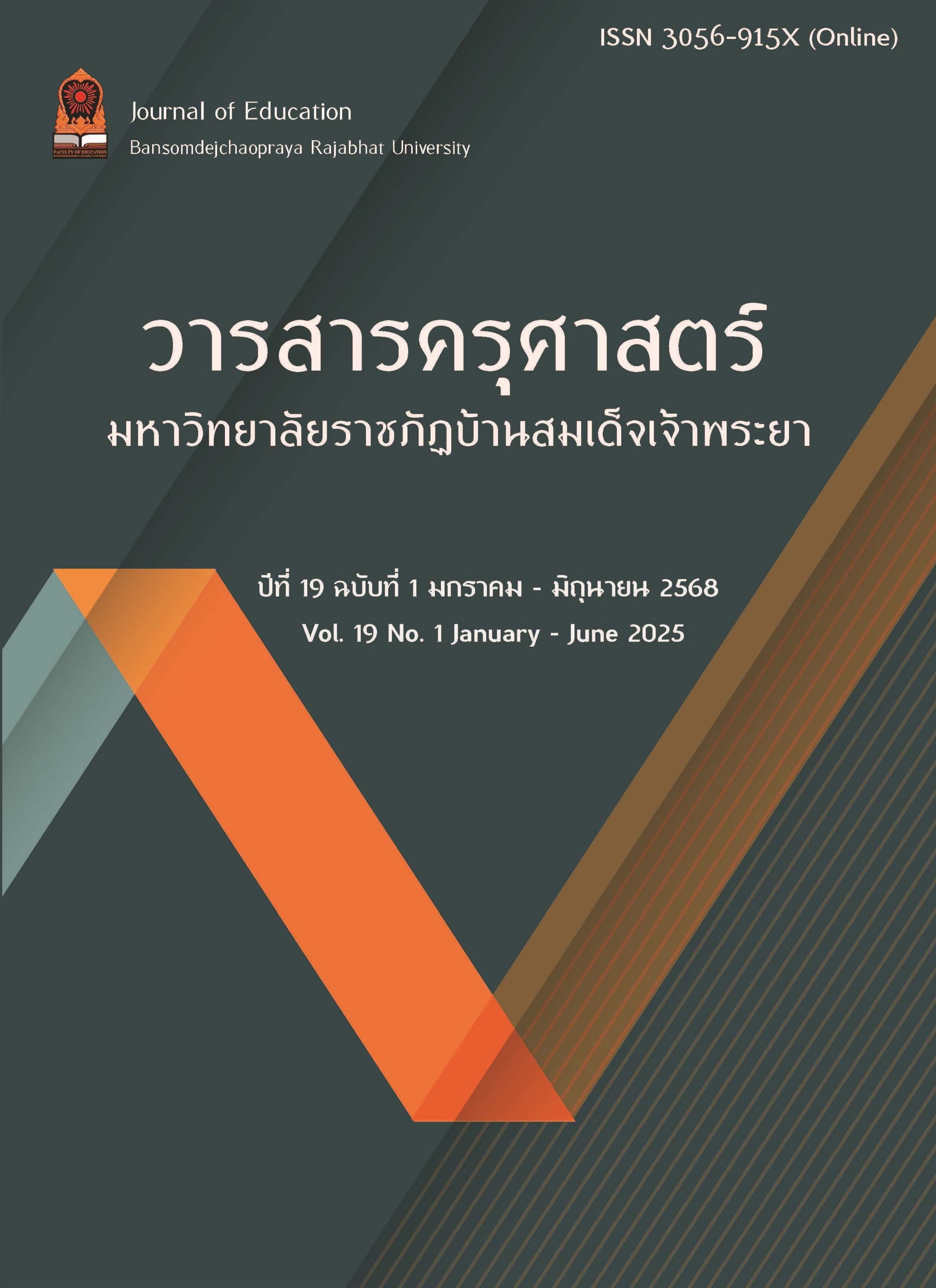The The Relationship Between 21st Century Leadership of School Administrators and the Effectiveness of Primary Schools in Chonburi Province
Keywords:
21st Century Leadership, School Administrator, Primary school EffectivenessAbstract
This research aimed to study the relationship between 21st century leadership of school administrators and the effectiveness of primary schools in Chonburi Province. The sample consisted of 332 people, consisting of 161 school administrators and 161 academic teachers under the Office of the Chonburi Primary Educational Service Area 1-3, who worked in the academic year 2024, and were selected by stratified random sampling. The research instrument was a 5-level rating scale questionnaire with a reliability of 0.94. The statistics used for data analysis were percentage, mean, standard deviation, and Pearson Product Moment Correlation Coefficient.
The results of the research found that
- The 21st century leadership of school administrators in primary schools in Chonburi Province was overall at a high level, ranked from highest to lowest average scores there were; 1) strategic leadership 2) transformation Leadership 3) innovative leadership 4) digital leadership r 5) disruptive leadership 6) visionary leadership 7) creative leadership 8) academic Leadership 9) moral and ethical Leadership and 10) service-oriented Leadership.
- The effectiveness of primary schools in Chonburi Province was overall at a high level, ranked from highest to lowest average scores there were: 1) educational quality assurance 2) educational institution development ability 3.) academic achievement 4) team building 5) teacher job satisfaction 6) conflict management and 7) educational resource management.
- The 21st Century Leadership of School Administrators and the Effectiveness of Primary Schools in Chonburi Province was positively related at a high level (rXy=.762) with statistical significance at the .05 level.
Downloads
References
กมลทิพย์ เกษรพรหม และภูมิพิพัฒน์ รักพรมงคล. (2567). ปัจจัยการบริหารที่ส่งผลต่อประสิทธิผลของสถานศึกษาในอำเภอวังพรายพูย สังกัดสำนักงานเขตพื้นที่การศึกษาประถมศึกษาพิจิตร เขต 1. วารสารสมาคมพัฒนาวิชาชีพการบริหารการศึกษาแห่งประเทศไทย (สพบท). 6(3); 351-367.
ขวัญฤทัย ภู่สาระและคณะ. (2562). ความสัมพันธ์ระหว่างภาวะผู้นำเชิงสร้างสรรค์ของผู้บริหารสถานศึกษากับประสิทธิผลของสถานศึกษา สังกัดสำนักงานเขตพื้นที่การศึกษาประถมศึกษาพระนครศรีอยุธยา เขต 1.วารสารวิทยาการจัดการปริทัศน์. 21(2): 51-59.
ชัยยนต์ เพาพาน. (2559). แนวคิดและทฤษฎีพื้นฐานการเป็นผู้นำของผู้บริหารสถานศึกษาในศตวรรษที่ 21. วารสารบริหารการศึกษา มหาวิทยาลัยขอนแก่น. 12(1); 1-9.
ชาลี เปี่ยมพลอย และภูมิพิพัฒน์ รักพรมงคล. (2567). ภาวะผู้นำของผู้บริหารในศตวรรษที่ 21 ของสถานศึกษา สังกัดสำนักงานเขตพื้นที่การศึกษามัธยมศึกษากำแพงเพชร. วารสารสมาคมพัฒนาวิชาชีพการบริหารการศึกษาแห่งประเทศไทย (สพบท). 6(3); 114-127.
ณธกร ภาโนมัย และเพียงแข ภูผายาง. (2564). ปัจจัยการบริหารที่ส่งผลต่อประสิทธิผลของโรงเรียนสังกัดสำนักงานเขตพื้นที่การศึกษาประถมศึกษาชัยภูมิ เขต 3. วารสารวิชาการและวิจัย มหาวิทยาลัยภาคตะวันออกเฉียงเหนือ. 11(2); 212-224.
ปรเมศร์ กลิ่นหอม และคณะ. (2564). องค์ประกอบภาวะผู้นำในศตวรรษที่ 21 ของผู้บริหารสถานศึกษาในสถานศึกษา สังกัดสำนักงานคณะกรรมการการศึกษาขั้นพื้นฐาน.วารสารการบริหารการศึกษาและภาวะผู้นำ มหาวิทยาลัยราชภัฎสกลนคร. 31(8); 61-72.
ปรีชา บุญจิตร. (2566). ความสัมพันธ์ระหว่างภาวะผู้นำเชิงนวัตกรรมของผู้บริหารสถานศึกษากับประสิทธิผของสถานศึกษาสังกัดสำนักงานเขตพื้นที่การศึกษาประถมศึกษาอุดรธานี เขต 4. วารสารวิทยาการจัดการ มหาวิทยาลัยราชภัฎสกลนคร. 3(2); 93-107.
ปลายฟ้า แก้วพรหม. (2567). ภาวะผู้นำดิจิทัลของผู้บริหารสถานศึกษาที่ส่งผลต่อประสิทธิผลของโรงเรียน สังกัดสำนักงานเขตพื้นที่การศึกษาประถมศึกษาบุรีรัมย์ เขต 3. วารสารวิชาการแสงอีสาน. 21(2); 256-269.
วรชัย วิภูอุปรโคตร และคณะ. (2564). ภาวะผู้นำของผู้บริหารในสถานศึกษาขั้นพื้นฐานที่ส่งผลต่อการบริหารงานโรงเรียนในศตวรรษที่ 21. วารสารศึกษาศาสตร์ มหาวิทยาลัยกรุงเทพธนบุรี. 9(3); 14-27.
วรปรัชญ์ หลวงใย และคณะ. (2564). องค์ประกอบภาวะผู้นำของผู้บริหารสถานศึกษาในศตวรรษที่ 21. วารสารศึกษาศาสตร์ มหาวิทยาลัยทักษิณ. 21(1); 182-195.
วีระศักดิ์ บุญญดิษฐ์และคณะ. (2564). การพัฒนาการศึกษาสู่ศตวรรษที่ 21. วารสารมหาจุฬาตานีปริทรรศน์ มหาวิทยาลัยมหาจุฬาลงกรณราชวิทยาลัย.3(5); 53-63.
ศิวนาถ จิตโรจน์ และคณะ. (2567). ภาวะผู้นำของผู้บริหารในศตวรรษที่ 21 ที่ส่งผลต่อประสิทธิผลสถานศึกษา สังกัดสำนักงานเขตพื้นที่การศึกษาประถมศึกษานครศรีธรรมราช เขต 2. วารสาร มจร.อุบลปริทรรศน์. 9(2); 601-616.
สุภวัช เชาวน์เกษม และคณะ. (2564). ความสัมพันธ์ระหว่างภาวะผู้นำยุคดิจิทัลของผู้บริหารสถานศึกษากับประสิทธิผลโรงเรียน สังกัดสำนักงานเขตพื้นที่การศึกษามัธยมศึกษา เขต 1. กรุงเทพฯ : มหาวิทยาลัยเกษตรศาสตร์.
Georgia Hobbs. (2022). What Is 21st Century Leadership? Available https://www.lepaya.com/articles.
Jaap Scheerens. (2000). Improving school effectiveness. UNESCO: International Institute for Educational Planning.
James Strock. (2024). What Is 21st Century Leadership? Available https://servetolead.com/what-is-21st-century-leadership
Špela Javornik. et.al, (2023). Factors Contributing to School Effectiveness: A Systematic Literature Review. European Journal of Investigation in Health, Psychology and Education. (2023) 13; 2095-2111.
Downloads
Published
How to Cite
Issue
Section
License
Copyright (c) 2025 Faculty of Educaion Bansomdejchaopraya Rajabhat University

This work is licensed under a Creative Commons Attribution-NonCommercial-NoDerivatives 4.0 International License.
บทความที่ได้รับการตีพิมพ์เป็นลิขสิทธิ์ของคณะครุศาสตร์ มหาวิทยาลัยราชภัฏบ้านสมเด็จเจ้าพระยา
ข้อความที่ปรากฏในบทความแต่ละเรื่องในวารสารวิชาการเล่มนี้เป็นความคิดเห็นส่วนตัวของผู้เขียนแต่ละท่านไม่เกี่ยวข้องกับมหาวิทยาลัยราชภัฏบ้านสมเด็จเจ้าพระยา และคณาจารย์ท่านอื่นๆในมหาวิทยาลัยฯ แต่อย่างใด ความรับผิดชอบองค์ประกอบทั้งหมดของบทความแต่ละเรื่องเป็นของผู้เขียนแต่ละท่าน หากมีความผิดพลาดใดๆ ผู้เขียนแต่ละท่านจะรับผิดชอบบทความของตนเอง



